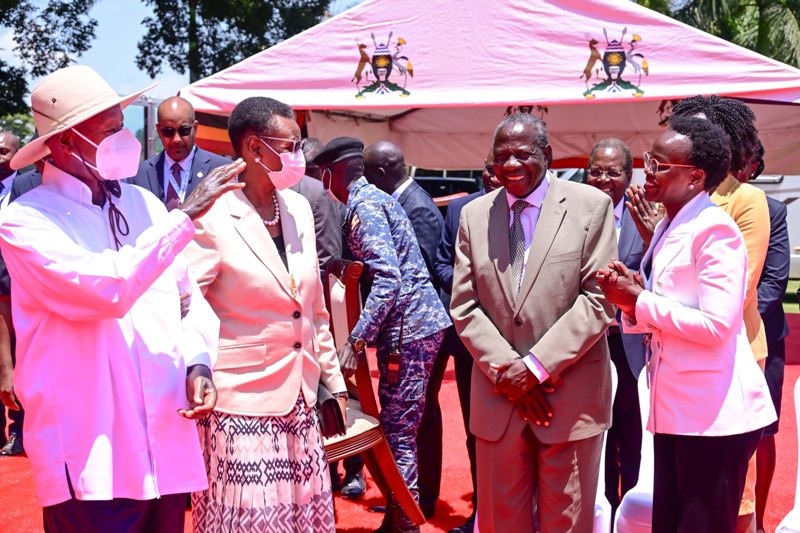Museveni champions development finance for Africa’s transformation, urges balance in projects and market integration
Tracing the necessity of DFIs back to the 1960s, President Museveni explained that relying solely on scarce private savings or foreign direct investment proved insufficient to industrialize Uganda.

President Yoweri Kaguta Museveni on Monday underscored the pivotal role of Development Finance Institutions (DFIs) in propelling Africa’s economic transformation, urging planners and financiers to strategically balance infrastructure spending with “results-generating projects” that draw millions into the money economy.
Speaking at the inaugural Uganda Development Finance Summit at the Commonwealth Resort Hotel, Munyonyo, President Museveni also called for the relentless pursuit of African market integration and sharply criticized commercial banks for what he termed “greed and dependency creation.”
The two-day conference, hosted by the Uganda Development Bank (UDB), brought together a diverse group of policymakers, government leaders, development financiers, private sector representatives, and international partners to deliberate on accelerating Africa’s social and economic transformation through strategic finance.
Tracing the necessity of DFIs back to the 1960s, President Museveni explained that relying solely on scarce private savings or foreign direct investment proved insufficient to industrialize Uganda.
“Your own people had no savings, and when they had money, they squandered it. Foreign investment could not easily be attracted compared to China. That is why I insisted we needed a Uganda Development Bank – a government institution that is not looking for profit but gives capital for infrastructure and wealth creation,” he stated.
He emphasized that UDB’s role is to provide patient capital to vital sectors like commercial agriculture, manufacturing and artisanship, and services such as tourism and ICT.
Market Integration: A Matter of Life and Death
Turning to the continental context, President Museveni stressed that thriving cities and industries require not only affordable money, electricity, and transport but also robust markets.
“As a strategist, I can tell you that integration of the African market is a matter of life and death. Without a big market, you cannot grow. That is the difference between the United States and Latin America. Latin America has water, minerals, everything, but remains poor because of market fragmentation,” H.E. Museveni argued, calling for unwavering political will and decisive action towards market integration across Africa.
The President also criticized Africa’s failure to capture value from its own resources, citing the example of coffee. “You produce a kilo of coffee and get $2.5. Somebody processes it into Nescafé and sells it for $40. Who is the donor? You are the donor, but you don’t know,” he quipped, challenging international financiers to channel patient capital into Africa, noting that China has already demonstrated the viability of such investments in Uganda.
“With Chinese money, we built Isimba Dam and now produce electricity at 4.8 cents per kilowatt hour. With Karuma, we produce at 2.8 cents. When we finish paying the loans, the cost will fall to 1.2 cents. That is transformation. That is what development means,” President Museveni explained.
Blasting Commercial Banks, Championing UDB
President Museveni sharply criticized commercial banks for their high-interest rates, which he believes stifle productive investments. “How do you lend at 22% per annum when inflation is below 5%? At such rates, people cannot do serious business, only quick import trade—perfumes and wines. These banks are engines of Africa’s dependence,” he asserted.
He reiterated that UDB remains the answer for financing productive sectors with affordable credit. “This one is ours. It will not run away. It is a guarantee,” he affirmed.
Earlier, the President highlighted the two crucial qualities for Africa’s transformation: vision and integrity, recalling that at independence, only 9% of Ugandan households were in the money economy, predominantly relying on three Cs and three Ts—coffee, copper, cotton, tobacco, tourism, and tea.
Africa’s Immense Potential
Minister of Finance, Matia Kasaija, echoed the President’s sentiments, stating that the summit was timely for Uganda and Africa. “Africa has immense potential and is poised to grow faster than most regions of the world. In 2024, five of the ten fastest-growing economies were in Africa. Uganda grew at 6%, compared to a world average of 2.7%,” he said.
Kasaija projected Uganda’s GDP, nearly $50 billion in 2023, to soar to $500 billion by 2040, driven by agro-industrialization, tourism, mineral development (including oil and gas), and ICT innovation, emphasizing UDB’s pivotal role in unlocking finance for these anchor sectors.
Dr. Patricia Ojangole, Managing Director of UDB, underscored that national development banks are central to building resilient and inclusive financial systems.
“Development finance institutions have propelled transformation globally. Asia’s rise and Brazil’s growth are credited to strong national development banks. Uganda was visionary in keeping UDB alive when others closed theirs during structural adjustment,” she noted.
Dr. Ojangole highlighted UDB’s commitment, stating that while commercial banks channel 45% of credit to non-productive sectors like real estate, UDB directs over 80% to agriculture, manufacturing, energy, water for production, education, and health.
“With climate change, digital transformation, and shrinking fiscal space, the role of NDBs is greater than ever. We must use innovative instruments like blended finance, finance digital infrastructure, and develop pipelines of bankable projects,” she urged.
Geoffrey T. Kihuguru, Chairman of the UDB Board, similarly stressed the centrality of development finance to Africa’s transformation. “We meet at a time of overlapping crises, geopolitical tensions, disrupted value chains, and climate change; yet Africa faces the urgent task of creating jobs for its youthful population. Development banks, working with DFIs, are uniquely placed to design instruments that expand inclusion, finance underdeveloped regions, and drive industrialization,” he concluded.







